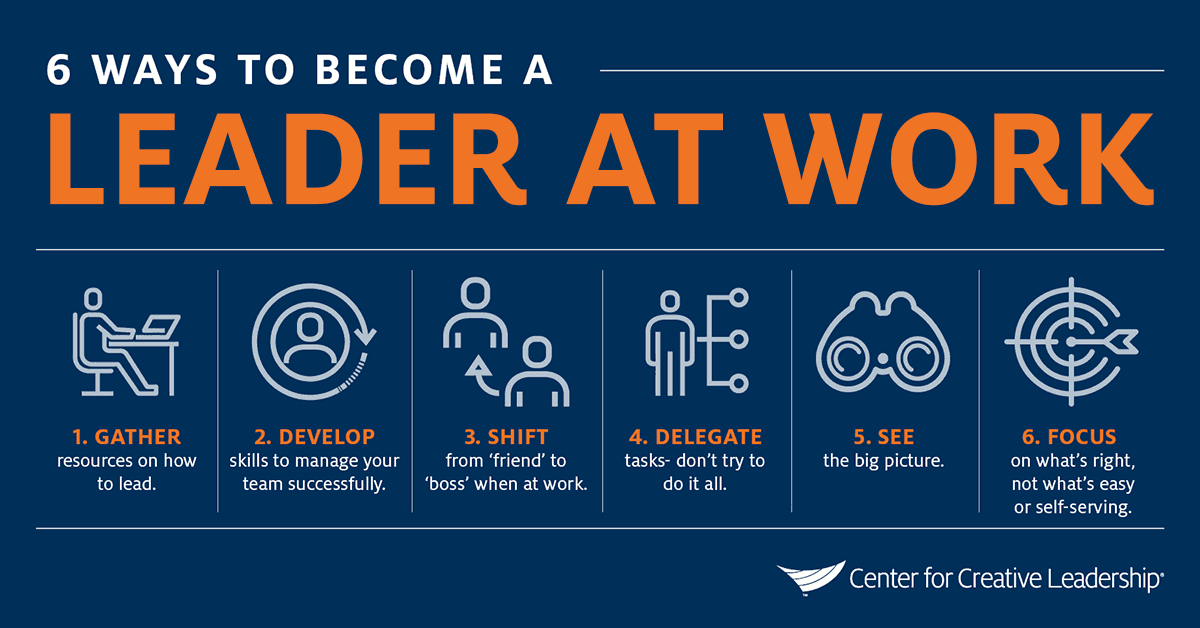Introduction
Nobody is born a perfect leader.
Like any skill, the ability to lead successfully has to be developed and nurtured. And first-time managers may feel especially unsure about what to do in their new role, particularly if they haven’t received any training on how to be a leader at work.
They may find it counterintuitive that the “script” they’ve had in their heads and relied upon until now — “my skills, my talents, and my technical knowledge have led to my success” — is no longer their ticket to success as new leaders.
In fact, sticking to the same script will actually make them less effective, because being an effective boss requires an identity shift.
Helping New Managers Understand How to Be a Leader at Work
6 Key Ways to Become a More Admired Leader
New managers — and even leaders with previous experience — can learn how to become a leader at work by following these 6 principles. If you’re not a new manager yourself, you may consider sharing these tips with colleagues who are:
1. Gather resources to learn about how to be a leader at work.
As explained in our book Be the Boss Everyone Wants to Work For, successful managers are able to flip their mindsets from “being a great individual contributor” to “being a team leader who motivates others to succeed.”
Our research found that such leaders tend to have a more open approach to learning than those stuck in the individual contributor mindset.
These leaders are motivated to learn because it’s fun, exciting, and engaging — not simply because it will bring them rewards, recognition, and recognition from others.
2. Develop skills to manage your team successfully.
Effective leaders work on their skillsets for team leadership:
- Communicating with others the way they want to be communicated with
- Influencing others to move work forward and gain support for their decisions
- Building and leading teams successfully
- Developing others’ skills by assigning them challenging tasks and providing ongoing feedback
Our research has found that managers who rely solely on the technical expertise that landed them their promotion into leadership were rated as less successful in their new roles.
3. Shift from “friend” to “boss” when at work.
Successful first-time managers know that former coworkers and friends will view them differently. They accept their new role and set clear expectations with their direct reports, some with whom they may already be friends.
They also treat everyone on their team fairly and avoid favoritism, so they can become an admired leader at work. It’s important that first-time managers build strong relationships with all of their direct reports, even those with whom they don’t “click.”
By making roles and responsibilities clear and keeping track of each team member’s progress, new managers can successfully improve team cohesion.
Ineffective leaders have trouble making the switch from “best friend” to “boss” while at work because they haven’t flipped their script from focusing on personal relationships to focusing on the relationship they have with their team.

Discover the art, science, and practice behind learning and leading as a first-time manager with this research-based book filled with practical advice and lessons.
4. Delegate tasks — don’t try to do it all.
Productive leaders drive team results by delegating tasks. They set goals for their team members, and they give positive and negative feedback to help them develop.
“Do it all” bosses who haven’t flipped their script still define themselves by the amount of work they alone do.
By not delegating, you convey the message that you don’t trust your team to do a good job. Team members stagnate, productivity slows, and the company suffers. But delegating shows trust in your team.
5. See the big picture.
New leaders face an abrupt change of perspective from “outsider” to “insider” when it comes to company politics. First-time managers are more productive and satisfied with their jobs when they accept politics as a necessary part of the bigger picture of leadership.
It’s critical for new leaders to gather information about those around them: the thoughts, behaviors, and needs of coworkers and stakeholders. They must observe behavior and determine what’s appropriate in any given situation.
In addition, it’s important for first-time managers to reach out beyond their current circles and gain new information from a diverse group of people within the organization. A broad perspective is key for promotion.
6. Focus on what’s right, not what’s easy or self-serving.
Leaders carry the responsibility to act on what’s right and best for the organization and those that it serves. Instead of acting with a self-focus, successful managers evaluate how their actions will affect their team, the organization, and everyone involved.
Developing integrity is essential for leaders, and comes with time and practice. New leaders should work to establish a strong moral code and hold their decisions against it, especially in difficult situations. It’s important they don’t allow a relationship, time pressure, or money to affect their judgment.
New managers who focus on integrity build trusting relationships with their team and are more likely to be successful in their careers and new roles … And this is especially key to be a leader at work who everyone admires.
Ready to Take the Next Step?
Explore our first-time manager training course, CCL Boost™ for New Leaders, an online tool to help you learn how to be a leader at work and shift from being an individual contributor to a successful manager of people.









